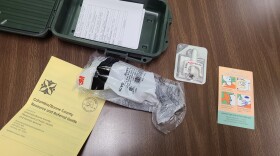-
The Trump administration sent hundreds of letters Tuesday terminating federal grants supporting mental health and drug addiction services. The cuts could total as much as $2 billion.
-
Contracts are in place for a $7 million project that will test the wastewater of public schools in Missouri for signs of fentanyl and other drug use.
-
An effort is underway by President Donald Trump and cities like Kansas City, Kansas, to clear unhoused people from living in public spaces. But one Overland Park mental health expert fears homelessness will be criminalized — not addressing the root issue and costing more than providing adequate access to care.
-
The FDA sent warning letters in June to the facility owners, Shaman Botanicals LLC and Relax Relief Rejuvenate Trading LLC, stating the 7-OH products were considered “adulterated” and their labels were illegal under federal food laws.
-
Kansas-City-based Shaman Botanicals LLC — the leading supplier of 7-OH in Missouri — received letters from both the FDA and Missouri Attorney General Catherine Hanaway.
-
For years, the Missouri Department of Corrections cobbled together death records from multiple sources. New data reveals, for the first time, that hundreds of people died in state prisons between 2018 to 2024.
-
Kansas City’s Wellness Court is partnering with a local yoga studio to offer a program called “Healing Justice.” It combines yoga, meditation, and cognitive behavioral therapy to reduce stress and recidivism among nonviolent offenders.
-
7-OH is sold as gummies, candies, imitation ice cream cones, liquid shots, tablets and powders. Kansas City-based Shaman Botanicals has been at the center of the drug's rise, and received a warning from the FDA.
-
For nearly a decade, overdoses have killed hundreds of Missourians annually as deadly synthetic opioids circulated among drug users. The latest data indicates the decrease in deaths could indicate a sustained trend.
-
A new three-part investigative series from The Kansas City Star highlights the rise of the drug 7-OH — a highly concentrated opioid-like substance derived from kratom — and the role of a Kansas City company in its growing popularity.
-
The U.S. Department of Health and Human Services appears poised to cut a $56 million annual grant program that pays for some of Missouri's overdose reversal medication and training.
-
A Wellness Court opened this month within Kansas City's Municipal Court, replacing the separate mental health and drug courts. The new approach offers a unique focus on co-occurring issues and lowers the barriers for people to get help.
Play Live Radio
Next Up:
0:00
0:00
Available On Air Stations










